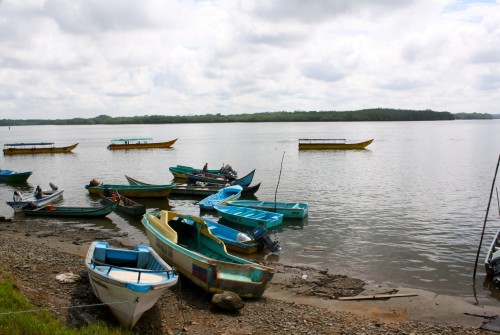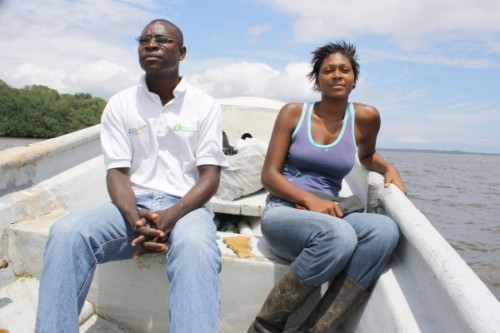This spotlight is a feature in a series of the USDA Community Food Project Competitive Grant Program (CFP) completed for WhyHunger’s digital storytelling website, Community Voices, that showcases grassroots organizations and community leaders through dynamic stories and pictures, to give a real view of projects that are working to alleviate food insecurity and increase communities’ access to nutritious food. We believe that telling one’s story is not only an act of reclaiming in the face of the dominant food narrative of this country, but also an affirmation that the small acts of food sovereignty happening across the country add up to a powerful, vital collective. Up today: Máximo Cangá Castillo, farmer and fisherman in San Lorenzo, Ecuador. Story and pictures by Andrianna Natsoulas.
Máximo Cangá Castillo active with local, national and grassroots organizations. He is a leader in his community and has fought against Columbian palm plantation owners and the invasion of shrimp farms. Máximo is active with the National Coordination for the Defense of the Mangrove Ecosystem.
San Lorenzo is in the northern Ecuadorian state of Esmeraldas on the Pacific coast. There, the farmers and fishermen face a daily barrage of assaults –land grabs, resource grabs, and murder.
 San Lorenzo, just a stone’s throw from the Colombian border, is filled with drug lords, Colombian paramilitary, members of FARC – the Revolutionary Armed Forces of Colombia, and residents of the community. Colombian palm plantation owners enter the state and seize farms. Drug lords establish cocaine labs in the jungles of the tropical coastal forests – the mangroves. Mangroves are bulldozed to make way for shrimp farms. Meanwhile, Monsanto lures farmers to work for them by offering free seeds. All the products are for export.
San Lorenzo, just a stone’s throw from the Colombian border, is filled with drug lords, Colombian paramilitary, members of FARC – the Revolutionary Armed Forces of Colombia, and residents of the community. Colombian palm plantation owners enter the state and seize farms. Drug lords establish cocaine labs in the jungles of the tropical coastal forests – the mangroves. Mangroves are bulldozed to make way for shrimp farms. Meanwhile, Monsanto lures farmers to work for them by offering free seeds. All the products are for export.
Máximo Cangá, a tall, proud, well-respected member of the community has experienced it all. At one time, he had a farm that was four hectares (nearly 10 acres). Suddenly, all the surrounding farms were sold to the Medellin Mafia of Colombia. But, Máximo refused to sell his land. The Mafia told him, “The farm belongs to us. You have to go get the money for your farm.” He told them, “But, my land is not for sale.” “Too bad, that is your problem,” they said. In response, Máximo filed a complaint with Plan Ecuador and to other authorities.
That complaint almost killed Máximo. Two hours after he filed the compliant, some men went to his house, but only his wife and children where there. Máximo was not. He maintains that if he had been, then he would have disappeared, which means, “They put you in a car and take you away. If you are lucky, your body will show up. Most of the time, people can’t even find the bodies of their loved ones. They have killed many peasants that way.”
Read the full profile at Community Voices, a WhyHunger digital storytelling site showcasing voices of leaders and communities across the country on the front lines of food justice.



